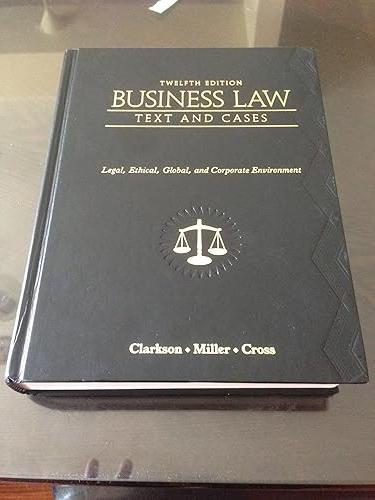On August 31, 1965 the plaintiffs, who are welfare recipients, agreed to purchase a home freezer unit
Question:
On August 31, 1965 the plaintiffs, who are welfare recipients, agreed to purchase a home freezer unit for \($900\) as the result of a visit from a salesman representing Your Shop At Home Service, Inc. With the addition of the time credit charges, credit life insurance, credit property insurance, and sales tax, the purchase price totaled \($1\),234.80. Thus far the plaintiffs have paid \($619.88\) toward their purchase. The defendant claims that with various added credit charges paid for an extension of time there is a balance of \($819.81\) still due from the plaintiffs. The uncontroverted proof at the trial established that the freezer unit, when purchased, had a maximum retail value of approximately \($300\).
The question is whether this transaction and the resulting contract could be considered unconscionable within the meaning of section 2–302 of the Uniform Commercial Code * * * .
* * * *
There was a time when the shield of caveat emptor [“let the buyer beware”] would protect the most unscrupulous in the marketplace—a time when the law, in granting parties unbridled latitude to make their own contracts, allowed exploitive and callous practices which shocked the conscience of both legislative bodies and the courts.
* * * *
The law is beginning to fight back against those who once took advantage of the poor and illiterate without risk of either exposure or interference.
* * * *
Section 2–302 of the Uniform Commercial Code enacts the moral sense of the community into the law of commercial transactions. It authorizes the court to fi nd, as a matter of law, that a contract or a clause of a contract was “unconscionable at the time it was made,”
and upon so finding the court may refuse to enforce the contract, excise the objectionable clause or limit the application of the clause to avoid an unconscionable result. The principle
* * * is one of the prevention of oppression and unfair surprise.
It permits a court to accomplish directly what heretofore was often accomplished by construction of language, manipulations of fluid rules of contract law and determinations based upon a presumed public policy.
* * * *
Fraud, in the instant case, is not present; nor is it necessary under the statute. The question which presents itself is whether or not, under the circumstances of this case, the sale of a freezer unit having a retail value of \($300\) for \($900\) (\($1\),439.69 including credit charges and \($18\) sales tax)
is unconscionable as a matter of law.
The court believes it is.
* * * *
Concededly, deciding [this case]
is substantially easier than explaining it. No doubt, the mathematical disparity between \($300\), which presumably includes a reasonable profit margin, and \($900\), which is exorbitant on its face, carries the greatest weight. Credit charges alone exceed by more than \($100\) the retail value of the freezer. These alone may be sufficient to sustain the decision.
Yet, a caveat [warning] is warranted lest we reduce the import of Section 2–302 solely to a mathematical ratio formula. It may, at times, be that;
yet it may also be much more. The very limited financial resources of the purchaser, known to the sellers at the time of the sale, is entitled to weight in the balance. Indeed, the value disparity itself leads inevitably to the felt conclusion that knowing advantage was taken of the plaintiffs.
In addition, the meaningfulness of choice essential to the making of a contract can be negated by a gross inequality of bargaining power.
Questions:-
1. Why would the seller’s knowledge of the buyers’ limited resources support a finding of unconscionability?
2. Why didn’t the court rule that the buyers, as adults, had made a decision of their own free will and therefore were bound by the terms of the contract, regardless of the difference between the freezer’s contract price and its retail value?
Step by Step Answer:

Business Law Text And Cases Legal Ethical Global And Corporate Environment
ISBN: 9780538470827
12th Edition
Authors: Kenneth W. Clarkson, Roger LeRoy Miller, Frank B. Cross





